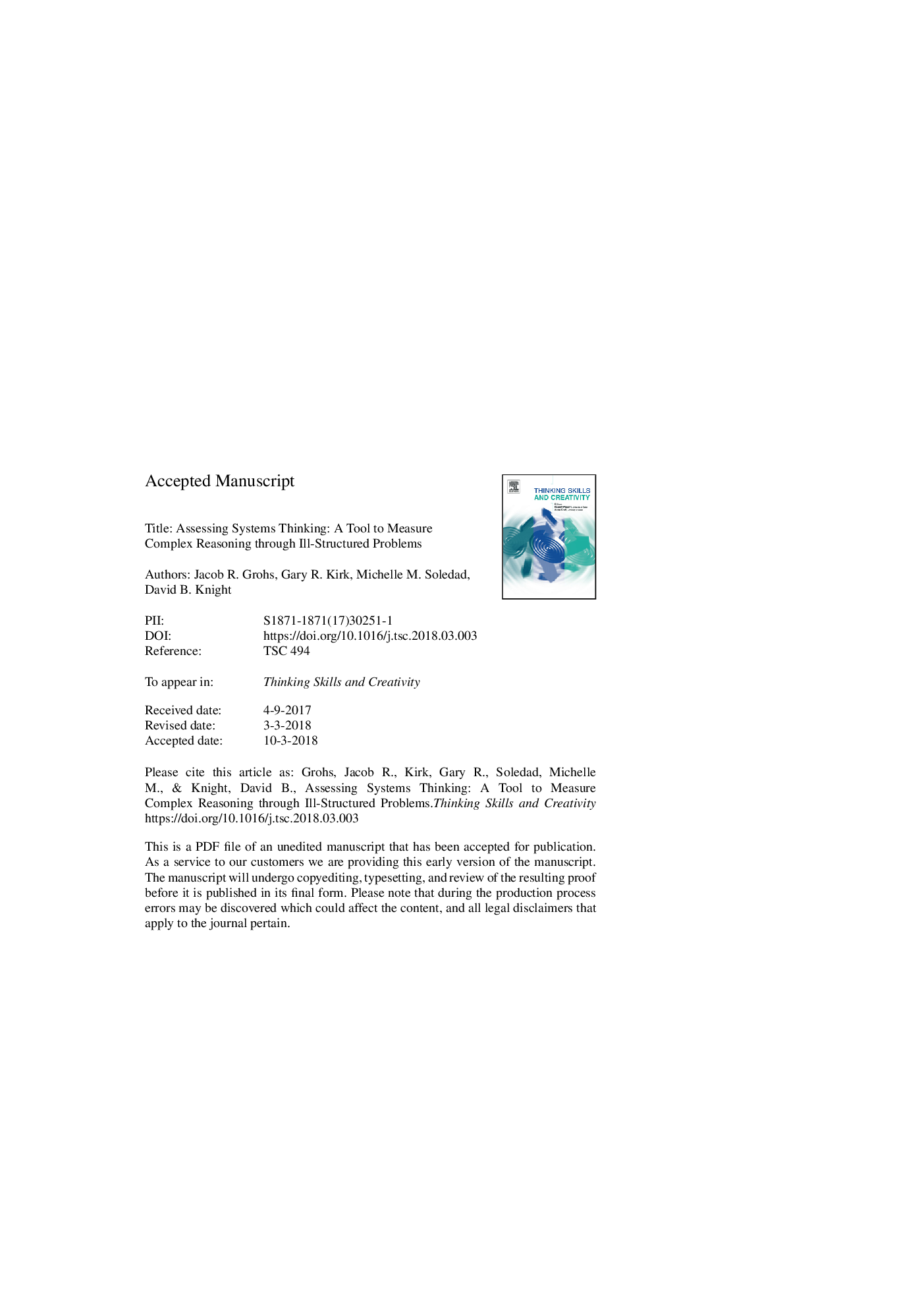| کد مقاله | کد نشریه | سال انتشار | مقاله انگلیسی | نسخه تمام متن |
|---|---|---|---|---|
| 6851863 | 1436831 | 2018 | 52 صفحه PDF | دانلود رایگان |
عنوان انگلیسی مقاله ISI
Assessing systems thinking: A tool to measure complex reasoning through ill-structured problems
ترجمه فارسی عنوان
ارزیابی سیستم های تفکر: ابزاری برای سنجش استدلال های پیچیده از طریق مشکلات ناخوشایند است
دانلود مقاله + سفارش ترجمه
دانلود مقاله ISI انگلیسی
رایگان برای ایرانیان
کلمات کلیدی
تفکر سیستمی، حل مسئله، مشکلات ناخوشایند، مشکلات پیچیده، مشکلات وحشتناک، ابزار ارزیابی، ارزیابی مبتنی بر سناریو، بخش، نتایج فراگیری کالج،
ترجمه چکیده
یک هدف فزاینده مهم آموزش عالی، توسعه فارغ التحصیلان است که قادر به پاسخگویی به مشکلات پیچیده و متقابل هستند. تفکر سیستمی یک مهارت بین رشته ای انتقادی است که انعطاف پذیری شناختی لازم برای همکاری در کار بر روی مشکالت جامعه را توصیف می کند. اگر چه موسسات آموزش عالی از توسعه سیستم فکر متخصصان و برنامه های بسیاری در جهت دستیابی به چنین هدف خواسته شده اند، مکانیسم هایی برای ارزیابی این صلاحیت وجود ندارد. این مقاله (1) یک چارچوب برای عملی کردن شایستگی تفکر سیستم را ارائه می دهد و (2) یک ابزار ارزیابی مبتنی بر سناریوی جدید مبتنی بر چارچوب دارد. این مقاله، توصیف توسعه تکراری سناریوی مشکل در سطوح اجتماعی و ردیف مقدماتی مرتبط با مجموعه ای از 93 پاسخ دانشجویی است. این ضمیمه شامل ابزار کامل شامل سناریوی مشکل، جایزه عنوان و سایر اسناد راهنمایی است تا دیگران بتوانند ابزار را برای اهداف تحقیق و یا برای ارزیابی نتایج دانش آموزان از برنامه های دانشگاه استفاده کنند.
موضوعات مرتبط
علوم انسانی و اجتماعی
روانشناسی
روانشناسی رشد و آموزشی
چکیده انگلیسی
An increasingly important aim of higher education is to develop graduates capable of addressing complex, interdependent problems. Systems thinking is a critical interdisciplinary skill that describes the cognitive flexibility needed to collaboratively work on problems facing society. Although institutions of higher education are asked to develop systems thinkers and many programs strive towards such an aim, mechanisms to assess this competency are lacking. This paper (1) presents a framework for operationalizing systems thinking competency, and (2) shares a novel scenario-based assessment tool based on the framework. The paper describes the iterative development of the community-level problem scenario and associated scoring rubric based on a set of 93 student responses. Appendices contain the full tool consisting of the problem scenario, scoring rubric, and other guiding documents to enable others to adopt the tool for research purposes or to assess student outcomes from university programs.
ناشر
Database: Elsevier - ScienceDirect (ساینس دایرکت)
Journal: Thinking Skills and Creativity - Volume 28, June 2018, Pages 110-130
Journal: Thinking Skills and Creativity - Volume 28, June 2018, Pages 110-130
نویسندگان
Jacob R. Grohs, Gary R. Kirk, Michelle M. Soledad, David B. Knight,
